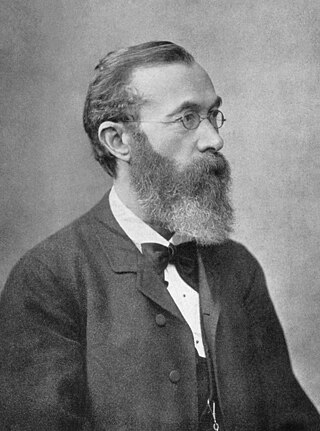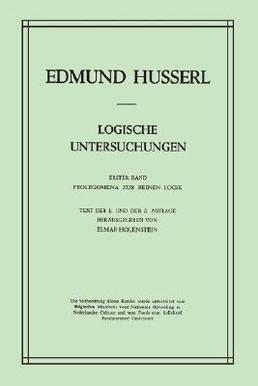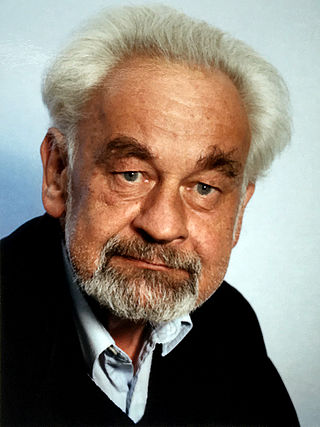
Edmund Gustav Albrecht Husserl was an Austrian-German philosopher and mathematician who established the school of phenomenology.

Maurice Jean Jacques Merleau-Ponty was a French phenomenological philosopher, strongly influenced by Edmund Husserl and Martin Heidegger. The constitution of meaning in human experience was his main interest and he wrote on perception, art, politics, religion, biology, psychology, psychoanalysis, language, nature, and history. He was the lead editor of Les Temps modernes, the leftist magazine he established with Jean-Paul Sartre and Simone de Beauvoir in 1945.

Wilhelm Maximilian Wundt was a German physiologist, philosopher, and professor, known today as one of the fathers of modern psychology. Wundt, who distinguished psychology as a science from philosophy and biology, was the first person ever to call himself a psychologist. He is widely regarded as the "father of experimental psychology". In 1879, at the University of Leipzig, Wundt founded the first formal laboratory for psychological research. This marked psychology as an independent field of study. By creating this laboratory he was able to establish psychology as a separate science from other disciplines. He also established the first academic journal for psychological research, Philosophische Studien, to publish the institute's research.
Phenomenology is the philosophical study of the structures of experience and consciousness. As a philosophical movement it was founded in the early years of the 20th century by Edmund Husserl and was later expanded upon by a circle of his followers at the universities of Göttingen and Munich in Germany. It then spread to France, the United States, and elsewhere, often in contexts far removed from Husserl's early work.

Franz Clemens Honoratus Hermann Josef Brentano was a German philosopher and psychologist. His 1874 Psychology from an Empirical Standpoint, considered his magnum opus, is credited with having reintroduced the medieval scholastic concept of intentionality into contemporary philosophy.

Alfred Schutz was an Austrian philosopher and social phenomenologist whose work bridged sociological and phenomenological traditions. Schutz is gradually being recognized as one of the 20th century's leading philosophers of social science. He related Edmund Husserl's work to the social sciences, using it to develop the philosophical foundations of Max Weber's sociology, in his major work Phenomenology of the Social World. However, much of his influence arose from the publication of his Collected Papers in the 1960s.
Philosophy of psychology is concerned with the philosophical foundations of the study of psychology. It deals with both epistemological and ontological issues and shares interests with other fields, including philosophy of mind and theoretical psychology. Philosophical and theoretical psychology are intimately tied and are therefore sometimes used interchangeably or used together. However, philosophy of psychology relies more on debates general to philosophy and on philosophical methods, whereas theoretical psychology draws on multiple areas.

Alexius Meinong Ritter von Handschuchsheim was an Austrian philosopher, a realist known for his unique ontology. He also made contributions to philosophy of mind and theory of value.

Ernst Alfred Cassirer was a German philosopher. Trained within the Neo-Kantian Marburg School, he initially followed his mentor Hermann Cohen in attempting to supply an idealistic philosophy of science.

Being and Time is the 1927 magnum opus of German philosopher Martin Heidegger and a key document of existentialism. Being and Time had a notable impact on subsequent philosophy, literary theory and many other fields. Though controversial, its stature in intellectual history has been compared with works by Kant and Hegel. The book attempts to revive ontology through an analysis of Dasein, or "being-in-the-world." It is also noted for an array of neologisms and complex language, as well as an extended treatment of "authenticity" as a means to grasp and confront the unique and finite possibilities of the individual.

Max Ferdinand Scheler was a German philosopher known for his work in phenomenology, ethics, and philosophical anthropology. Considered in his lifetime one of the most prominent German philosophers, Scheler developed the philosophical method of Edmund Husserl, the founder of phenomenology. Given that school's utopian ambitions of re-founding all of human knowledge, Scheler was nicknamed the "Adam of the philosophical paradise" by José Ortega y Gasset.
Neurophenomenology refers to a scientific research program aimed to address the hard problem of consciousness in a pragmatic way. It combines neuroscience with phenomenology in order to study experience, mind, and consciousness with an emphasis on the embodied condition of the human mind. The field is very much linked to fields such as neuropsychology, neuroanthropology and behavioral neuroscience and the study of phenomenology in psychology.
In philosophy, psychology, sociology, and anthropology, intersubjectivity is the relation or intersection between people's cognitive perspectives.

Helmuth Plessner was a German philosopher and sociologist, and a primary advocate of "philosophical anthropology".

Philosophy of Arithmetic: Psychological and Logical Investigations is an 1891 book about the philosophy of mathematics by the philosopher Edmund Husserl. Husserl's first published book, it is a synthesis of his studies in mathematics, under Karl Weierstrass, with his studies in philosophy and psychology, under Franz Brentano, to whom it is dedicated, and Carl Stumpf.

Dan Zahavi is a Danish philosopher. He is currently Professor of Philosophy at University of Copenhagen.

Ferdinand Fellmann was a German philosopher. After the expulsion of his family in 1946 out of Hirschberg Fellmann grew up in Hameln/Weser (Germany).
Intercultural philosophy is an approach to philosophy that emphasizes the integration of influences from different cultures. It can represent the meeting of different philosophical traditions, such as Western philosophy, Asian philosophy, and African philosophy.

The Logical Investigations are a two-volume work by the philosopher Edmund Husserl, in which the author discusses the philosophy of logic and criticizes psychologism, the view that logic is based on psychology.

Thomas Seebohm was a phenomenological philosopher whose wide-ranging interests included, among others, Immanuel Kant, Edmund Husserl, hermeneutics, and logic. Other areas of Professor Seebohm's interests included the history of philosophy, philosophy of history, philosophy of the formal sciences, methodology and philosophy of the human sciences, the history of 19th century British Empiricism, American pragmatism, analytic philosophy, philosophy of law and practical philosophy, and the development of the history of philosophy in Eastern Europe. Despite this diverse span of interests, Seebohm was chiefly known as a phenomenologist, who "above all...considered himself a creative phenomenologist, who as a critically reflecting philosopher would look at all major issues with which he became confronted, from a transcendental phenomenological point of view."














